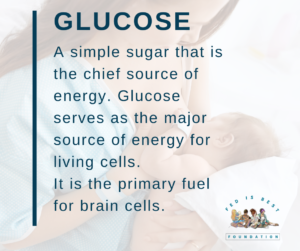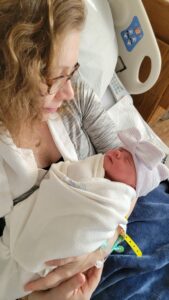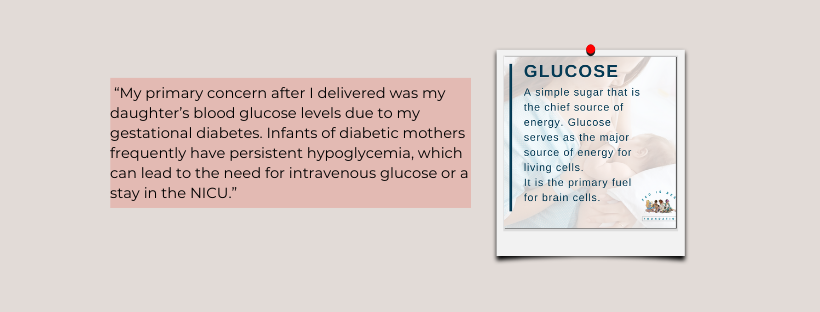I didn’t have the easiest pregnancy; for one thing, I was considered a geriatric pregnancy, given that medicine was my second career, and I waited until after residency to get pregnant.
I also have a history of depression and anxiety; thankfully, my depression was under control during pregnancy, but my anxiety certainly wasn’t – it worsened when I learned I was diagnosed with gestational diabetes (likely due mainly to my advanced maternal age).
In my mental preparations to have my baby, there was one thing I was always sure of: I would certainly attempt to breastfeed my child, but if it didn’t work out, that would be okay because, in my clinical experience, formula-fed babies did just fine. Furthermore, from the years of my struggles with my mental health, I learned the importance of choosing my battles, and it simply wasn’t worth it to me to agonize over breastfeeding if it didn’t come easily.
I had to be induced after I also developed gestational hypertension (thankfully, I had reached early term at 37 weeks and four days by that point). My primary concern after I delivered was my daughter’s blood glucose levels due to my gestational diabetes. Infants of diabetic mothers frequently have persistent hypoglycemia, which can lead to the need for intravenous glucose or a stay in the NICU.

I knew from clinical experience that it would take several days for my milk to come in fully, so I insisted that my daughter receive formula from the very beginning to ensure that her blood glucose remained stable. I had to push hard , as I delivered in a baby-friendly hospital, and I honestly believe that the staff (as wonderful and attentive as they were) would not have fully honored my request had they not known that I was a pediatrician.
One thing was very clear from the moment of her birth: my husband and I were to be our daughter’s strongest advocates and were committed to ensuring she remained stable and healthy.
I did attempt to breastfeed in the hospital and had the benefit of seeing a lactation specialist, but my daughter wouldn’t latch. I continued to try for a few days after we were at home, but again, it wasn’t worth the mental anguish of worrying whether I was producing enough milk or if she was transferring enough. I have continued to pump milk since delivering, but I don’t make much breastmilk, and as I’ve learned from personal experience, pumping is almost a full-time job. I choose now to pump sparingly, feed my daughter mainly formula, and enjoy every second I have with her. She’s growing and thriving; I’m so grateful for that and the knowledge I gained from my training as a pediatrician.
I hope that other mothers will feel the same ease choosing formula feeding as I do. For those who want to and can successfully breastfeed, that’s amazing, and I applaud and support their dedication! Either way, what’s most important is the physical and mental well-being of parents and children.

J. C. DO, FAAP Pediatrician
Know Your Risks for Delayed Onset of Full Breast Milk Supply
Why Was No One Listening To Me Or My Baby At Our Baby-Friendly Hospital? The Signs Were There.
HOW YOU CAN SUPPORT FED IS BEST
There are many ways you can support the mission of the Fed is Best Foundation. Please consider contributing in the following ways:
- Send us your stories. Share with us your successes, your struggles and everything in between. Every story saves another child from experiencing the same and teaches another mom how to safely feed her baby. Every voice contributes to change.
- If you need infant feeding support, we have a private support group– Join us here.
- If you or your baby were harmed from complications of insufficient breastfeeding please send a message to contact@fedisbest.org
- Make a donation to the Fed is Best Foundation. We are using funds from donations to cover the cost of our website, our social media ads, our printing and mailing costs to reach health providers and hospitals. We do not accept donations from breast- or formula-feeding companies and 100% of your donations go toward these operational costs. All the work of the Foundation is achieved via the pro bono and volunteer work of its supporters.
- Share the stories and the message of the Fed is Best Foundation through word-of-mouth, by posting on your social media page and by sending our FREE infant feeding educational resources to expectant moms that you know. Share the Fed is Best campaign letter with everyone you know.
- Write a letter to your health providers and hospitals about the Fed is Best Foundation. Write to them about feeding complications your child may have experienced.
- Print out our letter to obstetric providers and mail them to your local obstetricians, midwives, family practitioners who provide obstetric care and hospitals.
- Write your local elected officials about what is happening to newborn babies in hospitals and ask for the legal protection of newborn babies from underfeeding and of mother’s rights
- Click here to join our health care professionals group.
- Please send an email to Jody@fedisbest.org if you are interested in joining any of our volunteer groups.
- Send us messages of support. We work every single day to make infant feeding safe and supportive of every mother and child. Your messages of support keep us all going.

